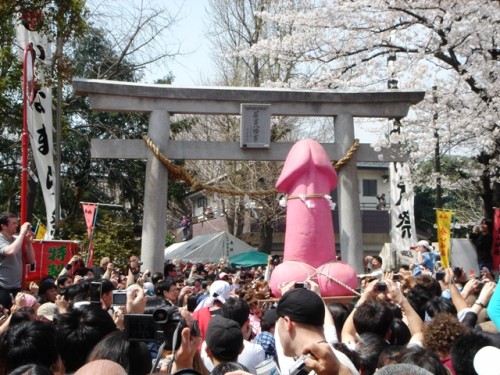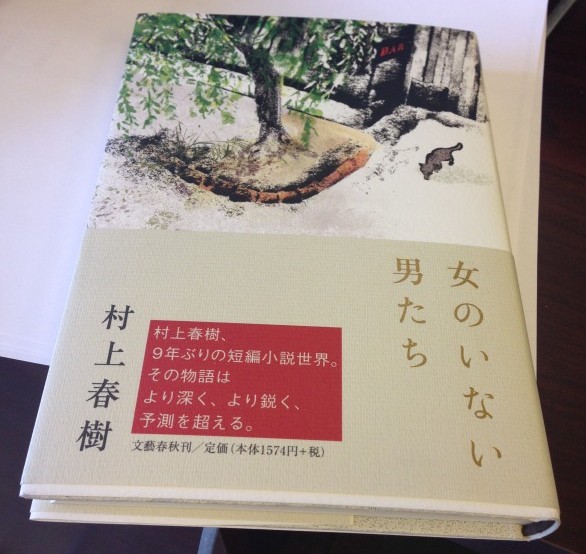Welcome to the Seventh Annual How to Japanese Murakami Fest!
With the goal of stirring up even more interest in Murakami between now and October, when the Nobel Prizes are announced, I will post a small piece of Murakami translation/analysis/revelation once a week from now until the announcement. You can see past entries in the series here:
Year One: Boobs, The Wind, Baseball, Lederhosen, Eels, Monkeys, and Doves
Year Two: Hotel Lobby Oysters, Condoms, Spinning Around and Around, 街・町, The Town and Its Uncertain Wall, A Short Piece on the Elephant that Crushes Heineken Cans
Year Three: “The Town and Its Uncertain Wall” – Words and Weirs, The Library, Old Dreams, Saying Goodbye, Lastly
Year Four: More Drawers, Phone Calls, Metaphors, Eight-year-olds, dude, Ushikawa, Last Line
Year Five: Jurassic Sapporo, Gerry Mulligan, All Growns Up, Dance, Mountain Climbing
Year Six: Sex With Fat Women, Coffee With the Colonel, The Librarian, Old Man, Watermelons
Year Seven: Warmth, Rebirth, Wasteland
Chapter 21 “Bracelets, Ben Johnson, Devil” is a beast. It’s the final chapter of the first half of Hard-boiled Wonderland and the End of the World and spans 38 pages in the Complete Works edition yet is only 17 pages in translation. There are more cuts in this chapter than anywhere else in the novel so far, and they are pretty interesting (I’m actually still coming across them—eight pages left to read). So I’ll tackle the chapter a cut at a time over the next few weeks.
In this part of the chapter, Watashi and the Girl in Pink head back to the laboratory under the waterfall to check on the old scientist.
In a way, this is the perfect Murakami chapter. Nothing happens. They mostly just walk. This gives them plenty of time to have conversations and for the narrator to sink into his thoughts. He actually does this immediately: He has no interest in going through any more of this ordeal, so he imagines himself with the girl wearing bracelets in the Nissan Skyline they saw in the previous chapter after getting hamburgers. (Bonus cut: In Chapter 19, page 188, Birnbaum translates the scene as “music” playing from the radio, but Murakami has them listening to Duran Duran – Hungry like the wolf!) He imagines the woman showering and having sex with only the bracelets on and, yare yare, he ends up with an erection. This is funny because he couldn’t get it up with the librarian earlier.
Birnbaum (or his editor) cuts liberally throughout, condensing the interiority and some of the dialogue. Then, as they hike, we come to this passage in the translation:
I was ready to turn back, but we forged on. She knew every step of the way and scampered ahead. When I trained my light on her from behind, her gold earrings flashed.
“Tell me, do you take off your earrings when you take a shower?” I spoke up.
“I leave them on,” she slowed down to answer. “Only my earrings. Sexy?”
“I guess.” Why did I have to go and bring up the subject?
“What else do you think is sexy? I’m not very experienced, as I said. Nobody teaches you these things.”
“Nobody will. It’s something you have to find out for yourself,” I said.
I made a conscious effort to sweep all images of sex from my head. (206)
It works well in translation, perhaps better than what Murakami initially wrote. Here is the Complete Works edition with my translation immediately following. To orient you, although the first line of the following passage is dialogue, Birnbaum rendered it above as narration:
「なにがどうなってもいいから、このまま帰りたくなったよ」
それでも我々は流れに沿って前進した。彼女が先に立ち、私があとにつづいた。私がライトを彼女の背中にあてると、切手くらいの大きさの金のイヤリングがきらきらと光った。
「そんな大きなイヤリングをいつもつけていて重くないのかい?」と私はうしろから声をかけてみた。
「慣れればね」と彼女は答えた。「ペニスと同じよ。ペニスを重いと感じたことある?」
「いや、べつに。そういうことはないな」
「それと同じよ」
我々はまたしばらく無言のうちに歩きつづけた。彼女は足場を知りつくしているらしく、ライトでまわりの風景を照らしながらすたすたと前に進んだ。私はいちいち足もとをたしかめながら、苦労してそのあとを追った。
「ねえ、君はシャワーとかお風呂に入るときにそのイヤリングをとるの?」と私は彼女においてきぼりにされないためにまた声をかけた。彼女はしゃべるときだけ歩くスピードを少し落とすのだ。
「つけたままよ」と彼女は答えた。「裸になってもイヤリングだけはつけてるの。そういうのってセクシーだと思わない?」
「そうだな」と私はあわてて言った。「そう言われれば、そうかもしれないな」
「セックスってあなたはいつも前からやるの?向いあったまま?」
「まあね。だいたいは」
「うしろからやるときもあるんでしょ?」
「うん。そうだね」
「それ以外にもいろいろと種類があるんでしょ?下になるのとか、座ってやるのとか、椅子を使うのとか……」
「いろんな人がいるし、いろんな場合があるからね」
「セックスのことって私よくわからないの」と彼女は言った。「見たこともないし、やったこともないし。そういうことって誰も教えてくれなかったの」
「そういうのは教わるもんじゃなくて、自分でみつけるものだんだよ」と私は言った。「君にも恋人ができて彼と寝るようになればいろいろと自然にわかるようになるさ」
「そういうのあまり好きじゃないのよ」と彼女は言った。「私はもっと……なんていうか、圧倒的なことが好きなの。圧倒的に犯されて、それを圧倒的にうけいれたいの。いろいろととか自然にじゃなくてね」
「君は多分年上の人と一緒に長くいすぎたんだよ。天才的で圧倒的な資質を持った人とね。でも世の中って、そういう人ばかりじゃないんだ。みんな平凡な人で、暗闇のなかを手さぐりしながら生きているんだ。僕みたいにさ」
「あなたは違うわ。あなたならオーケーよ。それはこの前に会ったときにも言ったでしょう?
しかしとにかく、私は頭の中から性的なイメージを一掃しようと決心した。私の勃起はまだつづいていたが、こんな地底の真っ暗闇の中で勃起したところで意味はないし、だいいち歩きにくいのだ。 (282-283)
“I don’t care what happens, I just want to get home in one piece.”
But we continued forth along the river. She took the lead, and I followed. When I shined the light on her back, her stamp-sized earrings glittered in the darkness.
“Doesn’t wearing big earrings like that get heavy?” I tried to shout up ahead to her.
“You get used to it,” she answered. “Same as a penis. Does having a penis ever get heavy?”
“Not really. That doesn’t happen.”
“It’s just like that.”
We continued walking in silence for a while. She seemed sure of her footing and proceeding at a quick pace, shining her light all around as she went. I labored on after her, carefully checking each step as I went.
“Hey, do you take off your earrings when you get in the shower or the bath?” I shouted up to her again so she wouldn’t leave me behind. She only slowed down when she was talking.
“I keep them on,” she answered. “Even when I’m naked. Think that’s sexy?”
“Uh, sure,” I said, flummoxed. “Now that you mention it, maybe so.”
“Do you always have sex from the front? Facing each other?”
“I guess. Usually.”
“You must do it from behind sometimes?”
“Yeah. Sometimes.”
“And there are a bunch of other ways too, right? You can be underneath or you can do it sitting down or using a chair…”
“There are lots of people and probably just as many ways to have sex.”
“I don’t really understand sex,” she said. “I’ve never seen it done and never done it. Nobody will teach me anything about stuff like that.”
“You don’t learn that stuff, you find it out for yourself,” I said. “You’ll come to understand all sorts of stuff once you get a boyfriend and start sleeping with him.”
“I don’t like stuff like that,” she said. “I like more…more devastating things. I want to be taken by someone with devastating force, and I want to take it in with equally devastating force. Not just naturally.”
“I think you’ve been with people older than you for too long. Geniuses with devastating intellects. But the world isn’t just filled with that kind of people. It’s filled with ordinary people fumbling their way through the darkness, trying to live. People like me.”
“You’re different. You are gonna be fine. Didn’t I tell you that the last time I saw you?”
For the time being, I resolved to clear my mind of all sexual images. My hard-on continued, but it was meaningless down here in the pitch dark and mostly just made it difficult to walk.
That last line is fantastic, and it’s too bad that BOHE didn’t find a way to keep it. I guess some of the other stuff is a bit ancillary, especially since there were similar scenes the first time they met when the girl comes off as a total horndog. (Although I am currently unable to locate the piece of dialogue she refers to when she says “Didn’t I tell you that the last time I saw you?”)
I like my rendering of “You are gonna be fine” because SPOILER ALERT we know that the narrator will not in fact be fine, but あなたならオーケーよ is probably closer to “You’re OK…(even if everyone else isn’t).”
I wasn’t quite sure what to do with 圧倒的に犯されて、それを圧倒的にうけいれたいの. And maybe that’s the reason BOHE cut the passage. 犯す gets listed as “rape, deflower, taken” in various dictionaries, so it probably has a range of meanings, and I don’t think the girl is asking to be raped, but she seems to be asking for force. Deflower seemed too formal for her, although maybe she needs formal. Any thoughts?
For the most part, as I mentioned above, the cuts are effective. BOHE keeps the key takeaway of the scene—she brings up sex again—but cuts the unnecessary bits. The penis line is especially awkward.
The good news is that all these posts build up to another cool cut—at least this week and next week’s post do. A very interesting cut two weeks from now, but next week is good too. Join me then.







